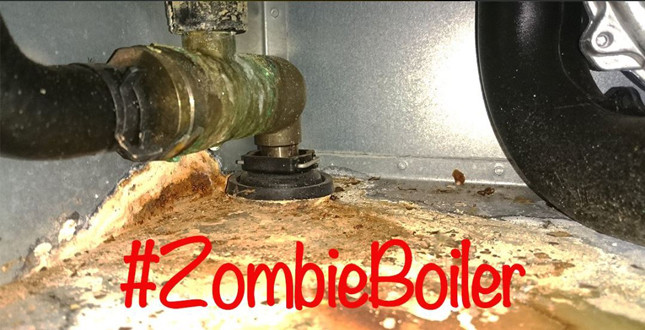

Tim Pollard explains why it's important to replace inefficient 'zombie' boilers with more energy efficient models
Our homes are in a zombie boiler apocalypse. Out of the 25 million with gas central heating, around nine million are estimated to house an ageing, inefficient boiler.
In fact, two million of these are believed to be harbouring a decrepit, barely functioning device that appears to be alive, but not in any rational form. These boilers refuse to die and often live alongside a collection of antique radiators, pipe work and controls, all contributing to inflated bills and equally uncomfortable living conditions. In these cases, residents even switch on additional heat sources to bring their homes up to a suitable temperature in the colder months.
In October, for the second year running, Wolseley rallied the country’s installer troops to slay these monsters and free homeowners from the gas-guzzling relics. We launched a competition for heating engineers to root out offenders in their line of work, and after receiving 30 entries, we named Gary Mellow from London Gas Services our winner with seven entries featuring some gruesome offenders.
But spotting these inefficient boilers isn’t confined purely to installers. When I was on the hunt for a new home, it shocked me the number of people who proudly showed off their ‘old faithful’ boiler. Far from adopting their affections, it made me more determined to get the message out that there are significant, unnecessary costs – even risks – associated with running an inefficient boiler.
Part of our role as a responsible merchant is to raise awareness, while making the issue something consumers can understand. Getting the cost message out there is one of the best ways, as everyone is concerned with making a dent in their annual energy bills.
The Energy Savings Trust recently revealed that by replacing a G-rated with an A-rated boiler, a 1,500kg carbon saving can be made each year – this is equivalent to a £350-a-year bill reduction. Ofgem statistics also show the average dual fuel bill reached £1,123 in 2016, and when controls are added to make as much as a further 20-30 per cent bill reduction, the up-front cost of replacement is very quickly recouped.
I’m a big advocate of the impact ErP labels have made since their introduction. They have given us an easily digestible way to illustrate the relative efficiency of appliances. Quite simply, the higher the efficiency, the lower the running cost – a poorly rated device is usually a dead giveaway that it is an older product and is probably due for replacement, bringing with it better safety features and smart control compatibility.
Some of the biggest zombie tell-tale signs are also regular breakdowns, with one in four homeowners experiencing one each year, or related hot water and heating problems. It may simply be that their relic resident exudes an unpleasant cacophony of noise, which could indicate low pressure, a worn out fan or blocked pump.
Armed with the right knowledge, and a trusted heating engineer who can give sound advice, I believe we really start to rid the UK of these monsters, while loosening their financial stranglehold on our bills in the winter months.
Tim Pollard, head of sustainability, Wolseley
If you'd like to keep up-to-date with the latest developments in the heating and plumbing industry, why not subscribe to our weekly newsletters? Just click the button below and you can ensure all the latest industry news and new product information lands in your inbox every week.